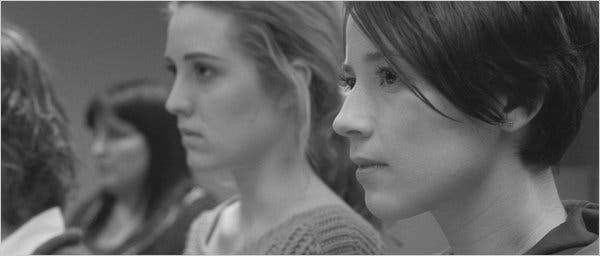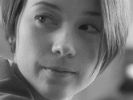Eye For Film >> Movies >> Polytechnique (2009) Film Review

On the 6th of December 1989 a young man walked into Montreal's École Polytechnique and shot 28 people, killing 14 of them, before turning his gun on himself. According to the note he left, he was enraged by feminists, whom he blamed for costing him opportunities in life, and he specifically set out to kill women. Though debate raged afterwards about whether or not it was appropriate to describe the event as an anti-feminist or misogynistic crime, Denis Villeneuve chose that angle for this fictionalised 2009 take on the shootings, expanding on the incident itself to explore three different perspectives on gender, society and everyday life.
The first of those perspectives is that of the killer. Revealed largely through Marc Lépine's own words (though he isn't named here), it takes up the first third of the film, and it won Maxim Gaudette a Best Supporting Actor award at the Genies. His is a challenging role in a film whose observational stance offers no room for emotional intimacy or extended character arcs. We don't hear about the abusive childhood raised in Lépine's defence in court; what Gaudette gives us instead is a sense of profound internal tension, of a pain and rage for which this man can imagine no other outlet. He might be read as monstrous or tragic, but whatever has brought him to this seems to have deep internal roots.

Focusing so tightly on Gaudette to begin with, Villeneuve then discards him, presenting him as little more than a machine for the film's remaining length. This has the effect of emphasising how little the victims understood about what was happening, and of putting the focus where it ought to be - not on a destructive man who might have seen such attention as reward for his actions, but on those whom he harmed. Acknowledging the sensitivities around the shooting (many felt this film should not have been made at all), writers Davidts and Leca have chosen to create fictional characters for this part of the tale, though their stories reflect the experiences of real ones. The first is a young man, Jean-François (Sébastien Huberdeau), whose self-awareness whilst others are overwhelmed by panic exacts a heavy toll. The second is a woman, Valérie (the extraordinary Karine Vanasse, deserving winner of a Best Actress Genie), an individual whose struggles to be taken seriously as an engineering student make a mockery of the ostensible reason for the assault she faces. It's a bitter irony that we sense she has encountered many times in life, though never so dangerously.
By bookending the film with Lépine and Valérie's stories, Villeneuve gives us the sense of a much wider social conflict brought into focus within this dangerous space, but by introducing Jean-François' perspective he suggests that it's misleading to think of it as a male versus female struggle. Of all the characters, Jean-François seems to have the least idea what's going on, and this has the effect of emphasising his sanity. His behaviour - warning to help but not knowing how, trying to undo some of the shooter's damage but feeling powerless to stop him - comes across as a challenge to those who said after the event that the men in the building were cowards for not defending the woman. Villeneuve shows us very effectively the confusion generated by the shooting and the crowd dynamics that made individual agency still harder to attain. Jean-François might represent every man who wants to stop violence against women but doesn't know how, and when we see him hugging his mother we seem to be bearing witness to different social possibilities - a reminder of the world beyond l'École.
The violence itself is depicted in a very plain, almost amoral manner - an aspect of reality with no innate emotional quality. Pierre Gill's beautiful black and white cinematography sees pools of dark blood intermingle on white linoleum floors. Outside, we pull back to see the city, the countryside, the frozen sea, the fractured ice making boundaries unclear. It is these landscape shots that provide the strongest sense of commentary and that give the film an existential quality. This is no TV-movie style real life horror re-run. It's something whose focus is cultural, moral and - eventually - personal. It will leave you feeling emotionally wounded as all such stories should but very rarely do. The crisp sound design here never lets those bullets echo but their import will echo in your head.
Reviewed on: 03 Mar 2013
















